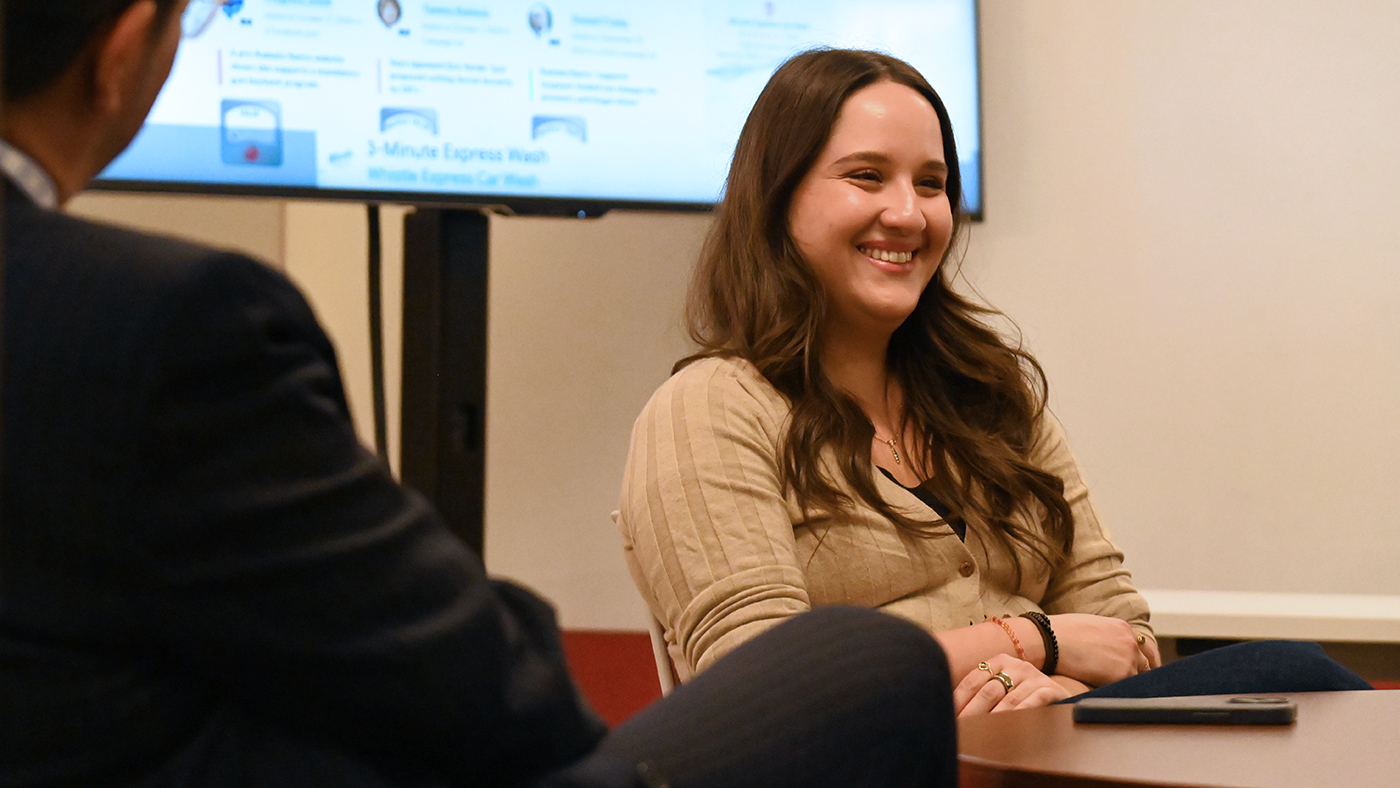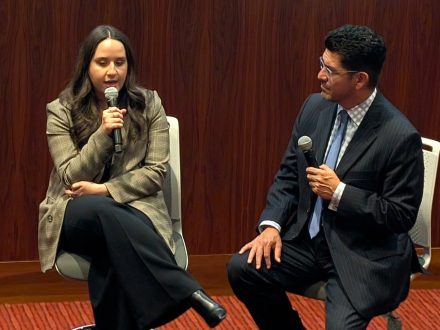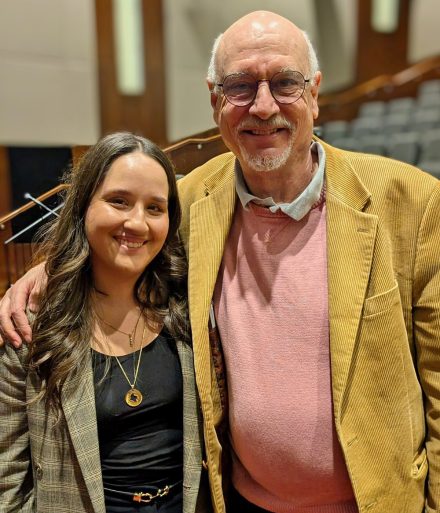The School of Communications graduate serves as an immigration reporter at PolitiFact, digging deep in topical subjects, translating complex issues into digestible stories, and making sure that facts are, indeed, facts.

Maria Ramirez Uribe ’20 is motivated by a desire to uncover the truth.
Since 2022, the Elon University alumna has served as an immigration reporter and fact-checker for PolitiFact, an online fact-checking platform operated by the Poynter Institute for Media Studies. The journalism and strategic communications double major explained that she finds great satisfaction in thoroughly researching topics, noting that – unlike many other journalism roles – fact-checkers can explore subjects in great detail.
“I really enjoy how deeply I can research a topic,” said Ramirez Uribe, a few hours before headlining the university’s Oct. 22 Alumni Voices discussion about the upcoming presidential election. “I feel privileged to be able to spend the time to talk to the experts, to really dive in and understand an issue, and to truly look into the data. It is something that most journalists don’t have the time and the capacity to do – to fully investigate a topic and learn about it.

“So, I feel an immense level of responsibility, but also a lot of privilege to get to do it.”
With Election Day just two weeks way, Ramirez Uribe’s campus visit corresponded with a crucial time in American politics. While her focus is immigration, her responsibilities stretch across the landscape of political misinformation, whether debunking viral social media claims or fact-checking statements from high-profile politicians. Working in both English and Spanish, she has also joined PolitiFact’s TikTok team, using creative content to explain complex political subjects to younger audiences.
In recent weeks, Ramirez Uribe has investigated claims that former President Donald Trump paid for Nelson Mandela’s travel to the U.S. in 1990, as well as Vice President Kamala Harris’ statements that the Biden-Harris administration cut the amount of fentanyl flowing into the country in half. Both claims were rated “False” on PolitiFact’s popular Truth-O-Meter scale.
Ramirez Uribe’s work involves more than just verifying facts. She dives into the data, consults experts, and transforms legal jargon into stories that resonate with readers. Her days are varied. She has interviewed public health experts about communicable diseases in Springfield, Ohio, and spoken with economists and subject matter experts on Medicare and Social Security. The topic of immigration intersects with many other subjects in the national conversation.
Plus, there is an additional wrinkle to fact-checking. Ramirez Uribe explained that fact-checking politicians can be quite different from general journalism because it requires taking a stronger stance.
“One of the biggest shifts for me was it’s a different type of writing, and it’s a different type of thinking about and presenting information,” she said. “It’s not general storytelling. It’s not writing the way that journalists write or that we’re taught to write. You have to be a lot more authoritative because you’re telling somebody they’re wrong.”
She also highlighted the difficulty of fact-checking misinformation when there’s limited or no available data, citing her experience investigating claims about fentanyl seizures in the U.S.
“It’s hard to fact-check something we don’t know, and when there’s no data about it,” she said.

Ramirez Uribe expressed great appreciation for the journalists she cites in her work, often referencing stories several decades old. Without their journalistic efforts, she wouldn’t be able to do her current job.
This underscores the enduring value of journalism.
“As I begin researching, inevitably more questions begin to pop up and I try to answer them as well,” she said. “So, I’m reliant on what was reported previously and the work of previous reporters … and it just proves the importance of journalism as a historic record.”
Assistant Professor Israel Balderas, who teaches Media Law and Ethics and participated in the Alumni Voices discussion with Ramirez Uribe, noted that the impact of her work at PolitiFact extends far beyond just correcting a false statement. No, there is more – significantly more – at stake, he explained.
“Maria represents the next generation of journalists who understand that fact-checking isn’t just about correcting the record – it’s about protecting democracy itself,” he said. “Her work, particularly her coverage of immigration issues, demonstrates how firsthand experience, combined with rigorous fact-checking, helps combat the spread of harmful misinformation that affects real communities and influences electoral outcomes.”
Ironically, Ramirez Uribe shared that she was not initially drawn to journalism. In fact, she resisted the idea when she enrolled at Elon. At that time, she was more interested in strategic communications. But her first-year Communications in a Global Age class, taught by Rich Landesberg, adjunct associate professor emeritx of journalism, changed her path.
“I did not want to be a journalist. I pushed back a lot. But Rich is the reason I’m in journalism,” she said.
The journalism professor immediately recognized Ramirez Uribe ‘s intelligence, focus and commitment to improving the world. As a result, he guided her toward the newsroom where she could use her many strengths.
“What a joy it was to have Maria in my classes,” Landesberg said. “She was challenging in the way we hope all of our students will be. Most importantly, she has a strong desire to make the world a better place by seeking and reporting the truth. One of her strongest skills is the one thing you can’t teach: passion for journalism.”
For Ramirez Uribe, the topic of immigration is deeply personal. She was born in Venezuela and relocated with her family to the Washington, D.C., area at the age of 12. That personal experience fuels her. Likewise, she credited her academic background and the community she built at Elon, especially her time at El Centro, for shaping her as a person and as a journalist.
“Elon is, without a doubt, the reason I am where I am today,” she said.


